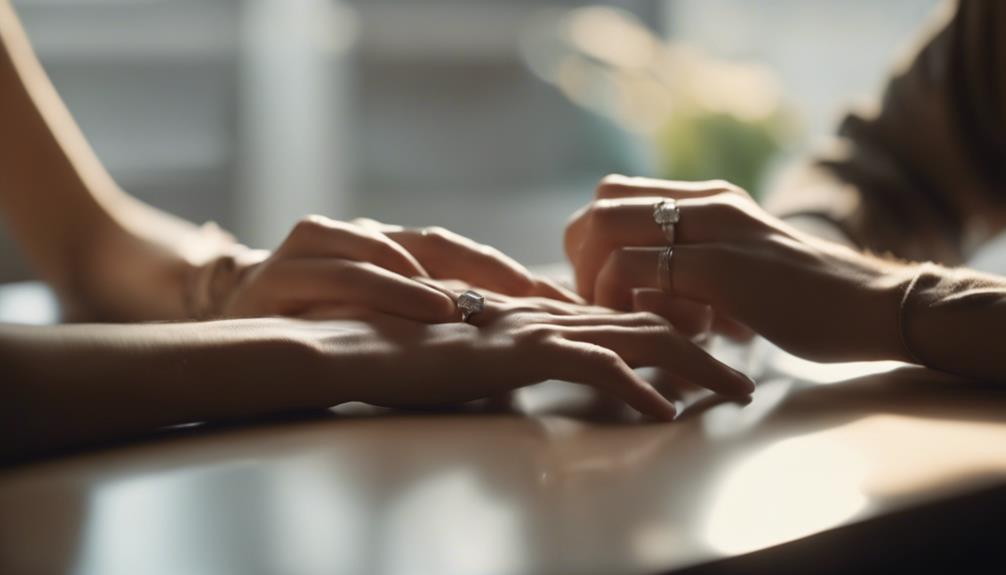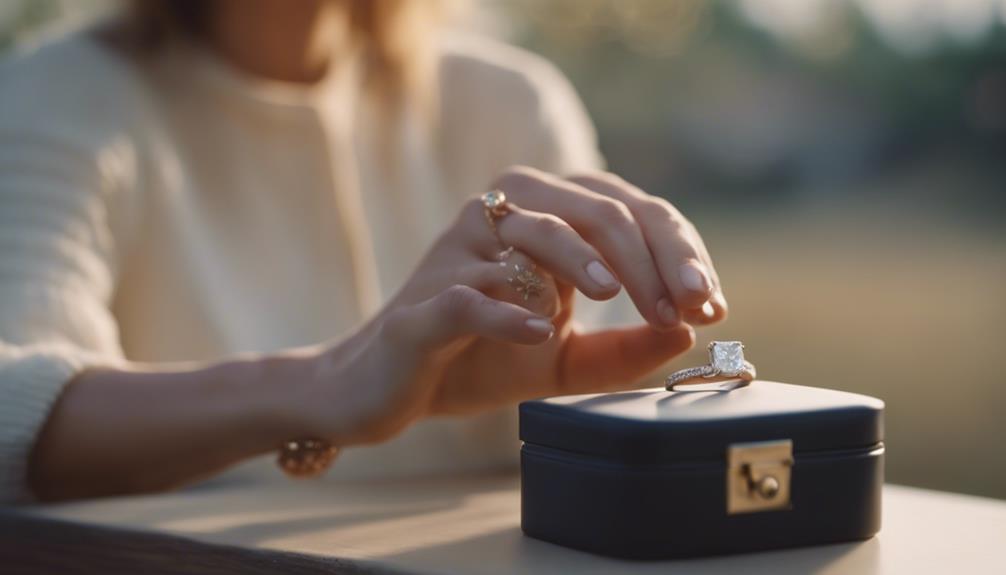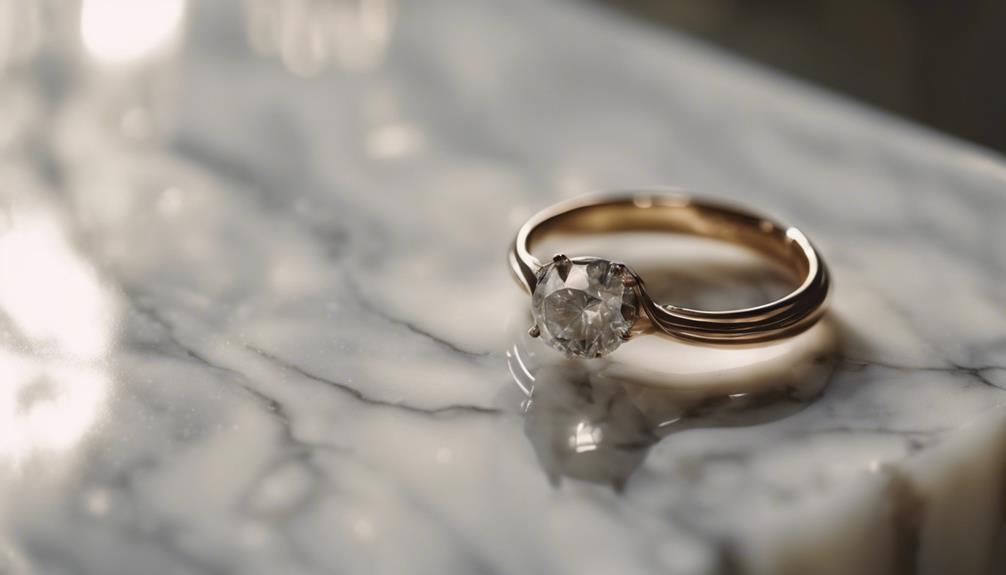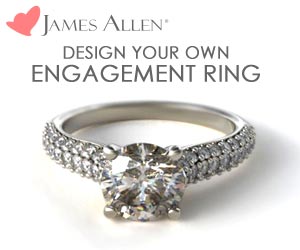Deciding whether to give an engagement ring back after a divorce can be tricky. Legally, the ring is often seen as marital property once you’re married, but rules vary by state. Culturally, expectations differ—some believe in returning it, while others don’t. Communication between you and your ex is essential to finding a fair solution. Emotionally, consider if keeping or returning the ring will help you heal. If returning feels right, it might bring closure. However, you could also repurpose or sell it. Curious about the specifics and exploring your options further might provide a clearer path forward.
Legal Considerations

Maneuvering the legal considerations surrounding an engagement ring after divorce can be complex and varies considerably by jurisdiction.
Typically, an engagement ring is regarded as a conditional gift. This means the promise of marriage is the condition that must be fulfilled for the gift to be finalized. If the marriage doesn’t happen, you generally need to return the ring to the giver.
However, once you’re married, the ring shifts from a conditional gift to marital property or a completed gift. In most states, if you divorce, you get to keep the engagement ring. The legal landscape can differ, though. For instance, in Pennsylvania, the Lindh v. Surman case mandates the return of the engagement ring if the engagement is terminated before marriage.
Prenuptial agreements can offer clarity on this issue. If you and your partner discuss and include terms about the engagement ring in a prenup, it can save a lot of hassle later.
In some cases, legal actions like a lawsuit for replevin might be necessary to recover the ring if the engagement ends and the recipient refuses to return it.
Understanding these legal nuances can help you navigate this potentially tricky situation more smoothly.
Cultural and Personal Perspectives
When it comes to returning an engagement ring after a divorce, cultural norms and personal beliefs play a significant role in shaping the decision. In many cultures, the engagement ring is seen as a symbol of a promise that, once broken, should be returned as a gesture of respect and closure. This cultural perspective views the ring as a conditional gift tied to the marriage promise, meaning that if the relationship ends, the ring should go back to the giver.
However, your personal beliefs are just as important. Some people see the engagement ring as a significant token of a shared commitment, even if the marriage doesn’t last. For them, the emotional attachment to the ring can complicate the decision to return it. It may be filled with cherished memories and milestones, making it hard to part with.
Social norms also vary widely. In some communities, keeping the ring is acceptable, while in others, returning it is expected. Friends and family can influence your personal perspectives on this matter, often shaping your decision based on collective opinions and cultural expectations.
Ultimately, the choice to return the engagement ring is deeply personal and influenced by a mix of cultural and emotional factors.
Communication Between Partners

Effective communication between partners is essential when discussing the return of an engagement ring after divorce. You need to approach this sensitive topic with respect and openness.
Start by setting a specific time and place to talk, ensuring a neutral and calm environment that fosters constructive dialogue. This way, both of you can express your personal feelings without the pressure of an emotionally charged setting.
When you bring up the subject, be clear about your thoughts and listen actively to your partner’s perspective. This mutual understanding can help you both navigate the complexities of the decision to return the engagement ring. It’s vital to convey your personal feelings honestly, as this transparency can aid in reaching an amicable agreement.
Additionally, documenting the conversation can be beneficial. Take notes or even consider a written agreement if legal considerations are involved. This documentation can serve as a reference and help avoid future misunderstandings.
Emotional Implications
Returning an engagement ring after a divorce often brings up a whirlwind of emotions, making the decision deeply personal and complex. You may find yourself grappling with the emotional attachment to the ring, as it symbolizes a commitment that held significant meaning. This small piece of jewelry can evoke memories of happier times, milestones, and shared dreams.
However, giving back the ring might also be a step towards closure. It can signify a finality to the relationship, allowing you to move forward and begin the healing process. The act itself can be both a symbolic and literal way to let go of the past, facilitating personal growth and acceptance of the new chapter in your life.
Still, the decision isn’t without its challenges. The grief associated with the end of a marriage can make the thought of parting with the ring particularly painful. Social expectations to return the engagement ring can add another layer of pressure, complicating your feelings further.
Balancing these emotions and the desire to respect traditions can be overwhelming, but ultimately, the choice should be what helps you find peace and move forward emotionally.
Alternative Options for the Ring

As you navigate the emotional terrain of returning or keeping the engagement ring, you might explore various alternative options for its future. These options can help manage both emotional and financial aspects. Here are three alternatives to reflect on:
- Repurpose the Ring: Transforming the engagement ring into a new piece of jewelry can allow you to retain its sentimental value while giving it a fresh start. This could mean creating a necklace, earrings, or even a different type of ring that holds new meaning for you.
- Sell the Ring: Selling your engagement ring can provide significant financial relief, especially during the challenging times following a divorce. Platforms like Worthy can help you auction the ring securely and get a fair price. The proceeds can be used for new beginnings or immediate financial needs.
- Donate the Proceeds: If you’re looking to turn a symbol of the past into something positive, think about selling the ring and donating the proceeds to a charitable cause. This can transform the emotional burden into a contribution that benefits others, giving you a sense of closure and purpose.
Exploring these options allows you to find a solution that aligns with your emotional and financial needs.
Conclusion
Ultimately, deciding whether to return the engagement ring after a divorce is a deeply personal choice that depends on legal, cultural, and emotional factors.
By considering the legal implications, respecting cultural norms, and communicating openly with your former partner, you can navigate this challenging decision more smoothly.
Remember, there’s no one-size-fits-all answer. Trust your instincts and prioritize what feels right for you and your unique situation.



